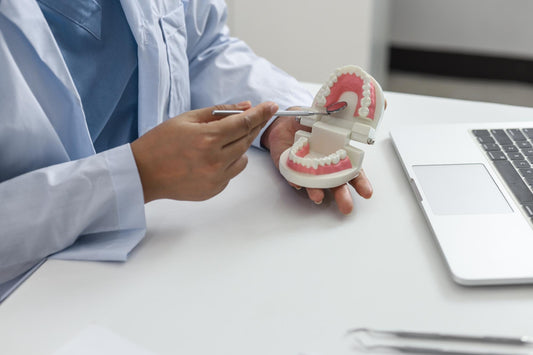What is Gum Disease and Why You Should Care?

What is Gum Disease and Why You Should Care? - Enzim Singapore
When people think about oral health, the first image that comes to mind is often pearly white teeth and a confident smile. However, behind every smile lies an equally important foundation: the gums. Without healthy gums, teeth lose their support, oral health deteriorates, and overall well-being is compromised.
Gum disease, also known as periodontal disease or "perio" for short, is one of the most common dental diseases in the world. Yet it often goes unnoticed until it is too late. According to the Centres for Disease Control and Prevention (CDC), nearly half of all adults over 30 have some form of gum disease. Severe gum problems, such as advanced periodontitis (also called pyorrhea), affect more than one billion people globally and are a leading cause of tooth loss.
In Singapore, where busy schedules, high-sugar diets, and stress often overshadow dental care, gum disease is a growing concern. It is sometimes called a "silent disease" because symptoms such as bleeding gums, swollen gums, or mild discomfort are ignored until they progress into painful, irreversible conditions.
Understanding gum disease its causes, symptoms, risks, and prevention is essential if you want to protect your smile, your health, and your confidence.
Gingivitis: The First Stage of Gum Disease
Gum disease does not develop overnight. It is a gradual process that begins with dental plaque and progresses in stages if left untreated.
-
Gingivitis: The earliest and mildest form of gum disease. It occurs when plaque accumulates on the gumline and irritates the gums, causing gingival inflammation, redness, gum swelling, and bleeding gums during brushing or flossing. This mild gum disease is reversible with proper oral hygiene and regular professional cleaning from a dentist or dental hygienist.
-
Periodontitis: When gingivitis is ignored, it can advance to periodontitis. In this stage, the infection spreads below the gumline. The gums begin to pull away from the teeth, creating gum pockets or periodontal pockets. Dentists use a periodontal probe to measure the depth of these pockets. Healthy gums usually measure 1–3mm, while deeper measurements indicate disease. Periodontitis causes attachment loss, meaning the bone and ligaments holding teeth in place are destroyed. Eventually, this leads to bone loss, loose teeth, and in severe cases, complete tooth loss.
-
Necrotizing gingivitis: A rare but severe form of gum disease where gum tissue dies, often seen in individuals with compromised immunity or poor nutrition.
Advanced gum disease often requires care from a gum specialist (periodontist), who may recommend surgical or regenerative treatments such as guided tissue regeneration or LANAP (Laser-Assisted New Attachment Procedure).
Bleeding Gums When Brushing: Why It Matters
The danger of gum disease lies in its subtlety. Unlike tooth decay, which often causes pain, gum disease can progress quietly. Key warning signs include:
-
Gums bleeding when brushing teeth or flossing
-
Swollen gums or gum swelling that persists
-
Gingival recession, where teeth appear longer due to shrinking gum tissue
-
Tender or inflamed gums that are red instead of pink
-
Persistent halitosis (bad breath) and an unpleasant metallic taste in the mouth
-
Formation of deep gum pockets that trap food and bacteria
-
Loose or shifting teeth
-
Painful chewing or sensitivity
If these symptoms are ignored, gum disease will progress and may eventually require more invasive gum treatment. Early detection is key to preventing long-term damage to gum and overall oral health.
What Causes Gum Disease?
Simply put, gum disease is caused by bacteria in the mouth. When bacteria accumulate, they release toxins that irritate and inflame the gums. But other contributing factors accelerate gum disease, such as:
-
Plaque buildup and calculus: Inadequate brushing and flossing lead to the accumulation of plaque, which hardens into calculus (tartar). Once hardened, calculus can only be removed through deep cleaning by a dentist.
-
Lifestyle habits: Smoking, alcohol consumption, and poor nutrition accelerate gum disease by weakening the immune system and encouraging bacterial growth.
-
Neglected dental visits: Many avoid routine dentist appointments or visits to a dental hygienist, missing out on early diagnosis and dental cleaning.
-
Systemic factors: Gum disease is linked to systemic inflammation and worsened by chronic inflammatory diseases such as diabetes, heart disease, and autoimmune conditions.
-
Ageing population: Elderly individuals often face gum issues due to reduced saliva flow, medication side effects, or limited access to dental care.
-
Stress and dry mouth: Stress reduces immunity and saliva flow, making gums more vulnerable to periodontal inflammation.
What Does Gum Disease Look Like?
Healthy gums are essential for more than just a stable smile. Mounting evidence shows gum disease has far-reaching consequences:
-
Cardiovascular disease: Bacteria from infected gums can enter the bloodstream, contributing to arterial plaque and increasing risks of heart attack or stroke.
-
Diabetes: Gum disease makes blood sugar harder to regulate. Conversely, diabetes increases the risk of periodontal infections a vicious cycle.
-
Respiratory infections: Oral bacteria can be aspirated into the lungs, leading to pneumonia or chronic bronchitis in older adults.
-
Pregnancy complications: Studies link severe gum disease to premature birth and low birth weight.
-
Other inflammatory conditions: Gum disease worsens chronic systemic inflammation, fuelling wider health problems.
This bidirectional relationship shows that gum disease is not just a dental disease but a public health concern.
Gum Pockets and Periodontal Pockets Explained
Preventing gum disease is much easier and less painful than treating it. Here are essential steps for protecting your gums:
-
Brushing teeth twice daily with fluoride toothpaste and a soft-bristle brush.
-
Flossing once daily to remove plaque between teeth.
-
Using interdental brushes to clean larger gaps where floss is ineffective.
-
Rinse with antibacterial mouthwash to reduce oral bacteria.
-
Limiting sugar intake and eating a balanced diet rich in vitamins and minerals.
-
Drinking plenty of water to maintain saliva flow.
-
Scheduling regular dentist appointments and professional cleaning sessions.
-
Consult a gum specialist if you notice persistent symptoms like gum pockets or gingival recession.
These practices not only prevent gingivitis but also help maintain long-term healthy gums.
Periodontal Disease: From Gingivitis to Tooth Loss
When gum disease progresses beyond mild gum disease, professional gum treatment is necessary. Common approaches include:
-
Scaling and root planing (deep cleaning): Removes calculus and bacteria below the gumline.
-
Non-surgical treatment with antibiotics: Controls infection in cases where bacteria are entrenched.
-
Dental x-rays: Help assess the extent of bone loss and monitor disease progression.
-
Guided tissue regeneration: A regenerative procedure used by a periodontist to encourage the regrowth of lost bone and gum tissue.
-
Attachment loss management: Special therapies aim to stabilise teeth affected by severe periodontitis or pyorrhea.
The earlier these treatments are sought, the more likely they are to succeed without invasive surgery.
Necrotizing Gingivitis: A Severe Gum Infection
Many commercial toothpastes contain sodium lauryl sulfate (SLS), a foaming agent. However, SLS can irritate sensitive gums, roughen tooth surfaces, and disrupt the balance of beneficial bacteria in the mouth. This makes the oral environment more prone to infections and damage to gum tissue.
Enzim toothpaste takes a different approach. Free from SLS and enriched with active enzymes such as amyloglucosidase, glucose oxidase, lysozyme, lactoferrin, and lactoperoxidase, it works with your natural saliva to restore the oral ecosystem. Its benefits include:
-
Preventing gum bleeding and gum irritation
-
Reducing dental plaque and harmful bacteria
-
Enhancing natural antibacterial defence
-
Promoting gum healing with colostrum, which has anti-inflammatory effects
-
Providing halal-certified, food-grade, safe oral care
By reinforcing saliva's protective function, Enzim toothpaste supports long-term gum health and helps prevent gum disease from taking hold.
Gum Treatment: Options for Different Stages of Disease
Gum treatment varies depending on the severity of the condition. For early gingivitis, improved home care, regular flossing, and professional cleaning may be enough. In more advanced cases, dentists may recommend deep cleaning, medication such as antibiotics, or even surgical options to restore lost tissue. The earlier gum treatment begins, the better the outcome for long-term oral health.
Gum Pocket Formation and Its Risks
A gum pocket forms when plaque and bacteria build up along the gumline, causing gums to detach slightly from the teeth. This creates spaces where bacteria can thrive, leading to infection and further tissue breakdown. If gum pockets are not addressed promptly, they may develop into deeper periodontal pockets, which are harder to clean and more destructive to oral health.
Periodontal Pocket: The Gateway to Tooth Loss
A periodontal pocket is deeper than a gum pocket and signals advanced periodontitis. Dentists measure pocket depth using a periodontal probe; anything above 4mm indicates active disease. These pockets trap bacteria and toxins that attack both gum tissue and bone, eventually leading to attachment loss, loose teeth, and in severe cases, complete tooth loss.
Swollen Gums: A Common Early Symptom
Swollen gums are one of the earliest signs that something is wrong with your oral health. This condition is often accompanied by tenderness and discomfort when eating or brushing. Swollen gums are typically caused by plaque buildup, but they can also result from vitamin deficiencies, hormonal changes, or irritation from ill-fitting dental appliances. Left untreated, swollen gums can progress into full-blown gingivitis and later, periodontitis.
Gum Swelling and Its Underlying Causes
While gum swelling is usually linked to poor oral hygiene and bacterial infection, it can also be triggered by systemic health issues such as diabetes, pregnancy, or certain medications that cause dry mouth. Gum swelling often appears localised around one tooth in cases of abscesses, but when widespread, it points to early gum disease. Identifying the root cause of gum swelling through a professional dentist appointment is crucial to prevent complications.
Gingival Recession: The Hidden Risk to Tooth Roots
Gingival recession occurs when gum tissue gradually wears away, exposing the roots of the teeth. This condition makes teeth more sensitive to hot, cold, and sweet foods, and also increases the risk of cavities in the root surfaces. Gingival recession is often caused by aggressive tooth brushing, chronic gum disease, or even genetic predisposition. Because exposed roots have less natural protection, gingival recession accelerates attachment loss and can ultimately contribute to tooth loss if left untreated.
Gum Specialist: When to See a Periodontist
In complex or severe cases of gum disease, a gum specialist also known as a periodontist—may be required. Periodontists are trained to treat advanced gum problems, including deep periodontal pockets, gum recession, and bone loss. They also perform procedures such as guided tissue regeneration to restore damaged tissues. If your dentist recommends seeing a gum specialist, it usually means gum disease has reached a level that requires specialised care.
Final Thoughts: Protecting Your Gums with Enzyme-Based Care
Gum disease is one of the most common dental diseases worldwide, yet it is also one of the most preventable. It begins silently with gingivitis and, if ignored, progresses into periodontitis, causing gingival recession, deep gum pockets, attachment loss, and even tooth loss.
But prevention is simple: daily oral hygiene, regular dentist appointments, and choosing the right products. By switching to an enzyme-based, SLS-free toothpaste like Enzim, you strengthen your gums, restore your natural defence, and protect your long-term health.
Your gums are the foundation of your smile. Care for them daily, and they will support not only your teeth but your overall wellbeing, reducing the risk of related inflammatory diseases and heart disease.



